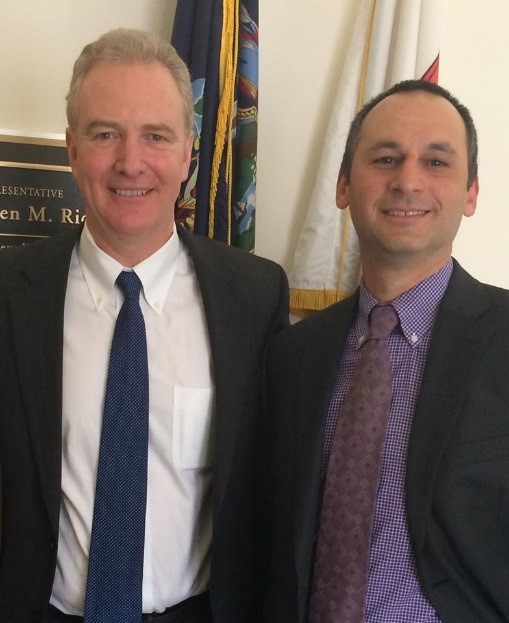Washington Snapshot - January 6, 2017
In this Week's Edition of Snapshot...
- Tuesday kicked off the 115th Congress
- The proverbial ball is officially rolling toward tax reform
- House and Senate tax-writing committees welcome new members
- In the States: NY and DC take action on minimum wage and paid family leave
- Opinion: nonprofits should push for smart public policy
 News from the Hill
News from the Hill
Welcome to the 115th Congress!
This past Tuesday, the Council’s Government Relations (GR) team spent the day on Capitol Hill attending swearing-in ceremonies for the newly (re)elected Representatives and Senators.
We congratulated our champions, including Senate Philanthropy Caucus co-Chair Richard Burr (R-NC) and House Philanthropy Caucus co-Chair John Lewis (D-GA) and spent time building and strengthening relationships with members and staff alike. Perhaps most important was the opportunity meet and talk with many of the fifty nine newly elected members of Congress.

Pictured above: The Council’s Senior Vice President of Government Relations with newly-elected Senator, Chris Van Hollen.
So, What’s Up with Tax Reform?
In the coming months, we will provide weekly updates with new developments in the tax reform process.
With the swearing-in of the new Congress, there are both additions to and subtractions from the House and Senate tax-writing committees.
On the House Ways and Means Committee, it was announced that Representatives
- David Schweikert (R-AZ),
- Jackie Walorski (R-IN),
- Carlos Curbelo (R-FL),
- Suzan DelBene (D-WA)
- Brian Higgins (D-NY), and
- Terri Sewell (D-AL)
will join the Committee to replace Charles Boustany (R-LA), Bob Dold (R-IL), Todd Young (R-IN), Charlie Rangel (D-NY), and Jim McDermott (D-WA). The Democrats will more than likely have one additional seat to fill in the near future, as Xavier Becerra (D-CA) was officially nominated this week to be California’s new Attorney General.
Additionally, Charles Boustany’s departure leaves the chairmanship for the Subcommittee on Tax Policy vacant. Ways and Means Republicans are expected to fill this position.
On the Senate Finance Committee, Senators Bill Cassidy (R-LA) and Claire McCaskill (D-MO) will replace outgoing members, Dan Coats (R-IN) and Chuck Schumer (D-NY).
Members of these committees will be instrumental in crafting tax reform legislation that will be introduced in the coming months. The speculation around the progression of this legislation remains largely the same—the Ways and Means Committee is expected to introduce a bill within the coming months, with a full vote on the House floor as early as April. Currently, Republican members of the Ways and Means Committee are meeting in working-groups on specific tax issues to follow-up on the efforts of their retreat in December.
Tax reform progression in the Senate is still expected to move a bit more slowly—with items like the repealing the Affordable Care Act and the process of confirming President-elect Trump’s cabinet nominations taking priority. It is still likely, though, that we will begin to see movement by the Senate on tax reform during the second half of the year.
 Happening in the States
Happening in the States
Exclusive from our colleagues at the National Council of Nonprofits.
Exclusive from our Colleagues at the National Council of Nonprofits.
NY and DC Advance Employment Standards Changes
With federal employment standards holding steady or on hold, state and local jurisdictions continue to set their own rates.
In late 2016, the State of New York announced a plan to increase the state minimum wage from $9 per hour to $15 per hour over the next six years for most employees. At the same time, the State announced a schedule for raising the minimum salary-level component of the exemption from overtime from the current New York level of $675 per week to up to $1,125 per week ($58,500/annually) in parts of the state over the same period. For employers in New York City with 10 or more employees, the salary level minimum will increase to the new $1,125 weekly threshold by 2018. Smaller employers in the City and all employers in three “downstate” counties will reach the new highest threshold in 2021 and 2022, respectively. The rest of the state will increase to $937.50 weekly ($48,750 per year) in 2022. The first step of the increases started on December 31, 2016. The New York State rates override the federal minimum wage of $7.25 per hour and the salary threshold for the exemption from overtime, which is likely stay at $455 per week for the foreseeable future as a result of a federal court injunction and pending change in administrations.
On December 20, the District of Columbia City Council passed a measure that mandates paid family leave of eight weeks for a child’s birth or adoption, or placement of a foster child, six weeks to care for an ailing family member, and two weeks of personal sick time. Employees would be eligible to receive a portion of their weekly pay, with a cap of $1,000 per week. The legislation pays for the benefit, estimated to cost $250 million annually, through a payroll tax increase of .62 percent. It is unclear whether the Mayor will sign the bill, having expressed opposition to the measure’s price tag and concern that Maryland and Virginia workers, rather than DC residents, would be the primary beneficiaries.
 Philanthropy News and Op-Eds
Philanthropy News and Op-Eds
Opinion: Changes Coming for Nonprofits in the New Congress and Administration
The National Council of Nonprofits has published a look at six federal issues that will likely be taken up in the coming weeks and months, and lays out what they mean for the work of philanthropy and nonprofits.
In the article published in the Chronicle of Philanthropy, “Nonprofits Need to Stand Together to Push for Smart Public Policies,” the authors identify specific challenges and opportunities in budget and spending decisions, tax reforms (including threats to the charitable giving incentive), efforts to repeal and replace the Affordable Care Act (Obamacare), mandates on endowments, preserving nonprofit nonpartisanship, and perhaps promoting positive reforms to regulations and federal grantmaking rules.

.GIF)

